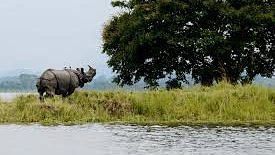Guwahati: The Gauhati High Court has kept pending a Public Interest Litigation (PIL) filed on the destruction of wildlife habitat in the Kaziranga National Park, the non-declaration of eco-sensitive zones, and the failure to protect traditional animal corridors.
On Thursday, a division bench of the High Court observed that a similar case was pending in the Supreme Court pertaining to illegal mining in Karbi Anglong district, and as such, it would not be advisable for the HC to issue any order.
The petition, filed by writer and journalist Rajeev Bhattacharya, highlighted concerns over the government’s failure to notify the eco-sensitive zone (ESZ) in Kaziranga National Park till date, despite directives from the central government and the Supreme Court. It also demanded a CBI inquiry or a court-monitored investigation into the reasons for the delay.
Kaziranga is home to the single-largest population of one-horned rhinoceroses, which accounts for two-thirds of the world population. Designated a UNESCO World Heritage Site in 1985, the park also has one of the highest tiger densities in India, and was declared a tiger reserve in 2007. The Karbi Anglong Hills, together with the wetlands of KNP, are integral to the survival of the wildlife in this landscape.
Almost two decades have gone by, but the eco-sensitive zones of KNP areas have not been demarcated, the petition mentioned. “The efforts for a viable ESZ of Kaziranga National Park along with ESZ of the adjoining protected areas of Karbi Anglong Elephant Reserve and the Kaziranga Tiger Reserve remained undecided since 2004,” it read.
It was also observed that the non-declaration of ESZ in Kaziranga has led to “change of land use” in and around the park.
In 2002, the Centre had taken a decision to notify ESZ in all national parks and wildlife sanctuaries. It was the responsibility of state governments to implement the decision as per local conditions, the petition stated. Four years later, the Supreme Court told all state governments to notify the ESZ.
The Assam government had sent proposals to the Centre—in 2009, 2015 and 2019—but they were all found “incomplete”, the petition noted. The Centre told Assam to make an “integrated corridor” with regard to Kaziranga, but no action was initiated.
The delay in declaration of ESZ in the national park has led to massive urbanisation, industrialisation, establishment of hotels, resorts and dhabas in an “unregulated and unchecked manner” around the entire Kaziranga landscape, the petition stated.
“Our concern is the massive mushrooming of resorts. As a result, many permanent structures have come up in the nine animal corridors. In 2019 and 2013, the Supreme Court ordered that mining should be stopped in the areas that fall in Karbi Anglong district. But mining has continued,” the petitioner said in a press statement Thursday.
“Despite SC’s orders and Centre’s directives, why isn’t the Assam government notifying the ESZ?” he asked.
“We have demanded a CBI enquiry into the reasons that have caused the delay in the notification. We have also demanded removal of all illegal permanent structures in the notified animal corridors in compliance of the Supreme Court’s directions on the said issues from time to time,” the petitioner added.
The petition pointed out how several human settlements adjacent to the park boundary are threatened by the incursion of wild animals, especially in the time of floods.
“Human-wildlife conflict is also common in this landscape with many incidents of big animals like one-horned rhinoceros, tiger, elephant, wild buffalo and swamp deer straying into the villages. Restoring the connectivity between Karbi-Anglong district and Kaziranga National Park is expected to reduce such conflicts for wildlife,” the petition mentioned, noting the importance of the Kaziranga-Karbi Anglong landscape.
Unless a viable plan was drawn up immediately, and all necessary measures taken, the petition cautioned that Kaziranga National Park would lose its very entity, and would no longer be able to stop the destruction of its animal corridors or the improper land use in its buffer zone.
It also raised concerns over uncontrolled human activities and change of land use irreversibly impacting the protection and conservation of wildlife.



